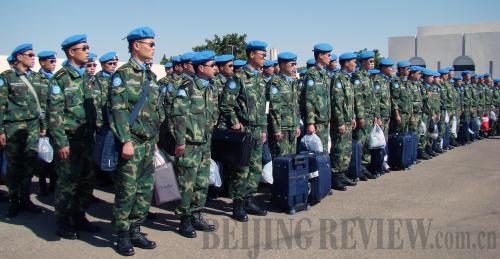|
 |
|
DEVOTION AND CONTRIBUTION: Members of a Chinese peacekeeping engineering unit rally shortly after their arrival at Nyala, capital of South Darfur, Sudan, on November 24, 2007 (XINHUA) |
By increasing and diversifying its involvement in UN peacekeeping missions, China is fulfilling its obligations as a responsible and peaceful power in the world community. In providing critically needed aid in some of the world's most dangerous places, moreover, Chinese peacekeepers have sown the seeds of peace—but very often at the risk of their own lives.
Chinese peacekeepers made their global debut in April 1990 when China dispatched five military observers to Cambodia. Then, in April 1992, it sent an engineering unit to Cambodia to repair roads, maintain airports and construct barracks. Later at the UN's request in January 2000, Beijing deployed its first contingent of peacekeeping police to East Timor, opening a new chapter in its efforts to help secure world peace while easing regional tensions.
According to data from China's Ministry of National Defense (MOD), more than 14,000 Chinese peacekeepers—including 1,569 police officers—have participated in UN missions to conflict-stricken nations like Lebanon and Liberia, making China the biggest contributor among all five permanent members of the UN Security Council. In addition, China has offered these countries a large number of facilities to help address their pressing needs.
Currently, there are more than 2,100 Chinese peacekeepers serving in 10 UN missions. They have embarked on a variety of work projects—ranging from engineering and transportation to medical services and disaster relief. The UN now operates 15 peacekeeping missions worldwide, employing a total of 115,000 peacekeepers.
Up until January 2010, Chinese peacekeepers have built or repaired more than 8,000 km of roads and more than 200 bridges, cleared 8,700 landmines and explosives and treated more than 60,000 patients, according to a report by Xinhua News Agency. They have also played a significant role in cracking down on local crime, resettling refugees, as well as providing protection for Chinese nationals overseas.
China has maintained strict selection criteria for its peacekeepers. Foreign language proficiency and physical stamina, for one, are among the basic requirements, along with mission-specific expertise. Prior to departure, they must also undergo intense trainings on skills such as emergency aid and basic field survival. This, in part, explains why they can weather difficulties on the ground, however intense they may be.
In the "death zone" of southern Lebanon, for instance, Chinese peacekeepers had to navigate rough terrain and detect active landmines inch by inch. The challenges facing Chinese peacekeepers are no less arduous in Africa, where infectious disease proliferates, widespread malaria puts millions of lives at risk and armed conflicts are common.
Such dedication to peace has won China praise and respect around the world. Many roads and bridges in the Democratic Republic of the Congo and Liberia are even named after the People's Republic of China in honor of the contributions of its workers and peacekeeping units.
Around the world, Chinese peacekeepers "take their duties very seriously and put hard effort into helping others secure peace and a normal life," said Dai Shao'an, Deputy Director of the MOD's Peacekeeping Affairs Office.
"Wherever they go or whatever they do, they are always mindful that they are messengers of peace, representing China," he added. "This sense of responsibility and dignity naturally leads to good deeds."
International observers agree. "All the soldiers, policemen and civilians coming from China in our peacekeeping missions are extremely well trained, well disciplined, professional and able to live in very hard conditions," said Alain Le Roy, UN Under-Secretary-General for Peacekeeping Operations, during a visit to China in November 2009.
While helping ensure the viability and success of peacekeeping operations, China's "blue helmets"—a common nickname for UN peacekeepers based on their attire—have also gained valuable field experience, as well as opportunities for exchanges with military forces and peacekeeping units from other countries, according to Shi Zhengbo, Director of the MOD's Peacekeeping Affairs Office.
As China's burgeoning economy continues to expand at a rapid pace, expectations for Beijing to play a bigger role in global peacekeeping efforts continue running apace.
China has already proven itself up to the task. With its agenda to assist countries stricken by wars and natural disasters under the aegis of UN peacekeeping operations, said Dai, Beijing wants "a peaceful world free from war or conflict, so people do not have to feel the pain." |
